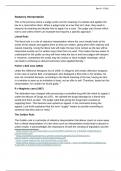Bao N - P2M1
Statutory Interpretation
This is the process where a Judge works out the meaning of a statute and applies the
law to a case before them. When a judge looks at a law that isn't clear, they need to
interpret its meaning and decide how to apply it to a case. The judge can choose which
rule to use unless there's an example that requires a specific approach. 1
Literal Rule:
The literal rule is a rule of statutory interpretation where the court simply looks at the
words of the statute and applies them as they are written, giving them their ordinary and
natural meaning. Using the literal rule will make the law more certain as the law will be
interpreted exactly as it is written every time that it is used. This makes the law easier to
understand for the public as they will know what the law is and how judges will interpret
it. However, sometimes the words may be unclear or have multiple meanings, which
can lead to confusing or absurd outcomes when applied literally. 2
Fisher v Bell case (1961)
Under the Offensive Weapons Act of 1959, it’s illegal to sell certain offensive weapons.
In the case of James Bell, a shopkeeper who displayed a flick knife in his window, he
was not convicted because, according to the literal meaning of the law, having an item
in a window is seen as an invitation to treat, not an offer to sell. Therefore, based on this
interpretation, he couldn’t be found guilty. 3
R v Maginnis case (1987)
The defendant was charged with possessing a controlled drug with the intent to supply it
under the Misuse of Drugs Act 1971. He claimed the drugs belonged to a friend who
would pick them up later. The judge ruled that giving the drugs back counted as
supplying them. This decision was upheld on appeal. In his comments during the
appeal, Lord Keith explained that the term "supply" means to provide something to
someone that they want or need. 4
The Golden Rule:
The Golden rule is a principle of statutory interpretation that allows courts to move away
from a literal interpretation of a law when such an interpretation would lead to absurd or
unfair results. It acknowledges the importance of both the wording of legislation and the
1
https://resource.download.wjec.co.uk/vtc/2020-21/ko20-21_1-8a/pdf/_eng/statutory-
interpretation.pdf
2
https://sjrlawblog.wordpress.com/wp-content/uploads/2015/04/statutory-
interpretation_advantages-and-disadvantages.pdf
3
https://www.lawteacher.net/cases/fisher-v-bell.php
4
https://www.reeds.co.uk/insight/cocaine-in-the-city/#:~:text=In%20R%20v%20Maginnis
%20(1987,3)%20of%20the%20MDA%201971.
, Bao N - P2M1
intention behind it, allowing judges to interpret laws properly. For example, if a law
states, "no vehicles allowed in the park," a literal reading could ban bicycles and
wheelchairs, resulting in unreasonable outcomes. By applying the golden rule, a court
could interpret "vehicles" to remove these forms of transport, ensuring that the law
serves its intended purpose while preventing unfair consequences. 5
Re Sigsworth (1935)
This case involved a son who murdered his mother to inherit her estate under the
Administration of Estates Act 1925, which stated that an estate should go to "the next of
kin." A literal interpretation would have allowed the son to inherit despite his crime.
However, the court applied the golden rule, deciding that it would be absurd and against
public policy to let a murderer benefit from their actions. As a result, the court ruled that
the son could not inherit, showing how the golden rule can prevent unfair outcomes. 6
R v. Allen (1872)
The defendant was charged under the Offences Against the Person Act 1861, which
made it an offense to marry while already being married. The literal interpretation of the
word "marriage" would suggest that it required the act of marrying, which could lead to
an absurd situation where a person couldn’t be convicted of bigamy because they
couldn’t marry anyone else. By applying the golden rule, the court interpreted
"marriage" more openly, allowing for the judgement of bigamy and preventing an
unreasonable outcome. 7
The Mischief Rule:
The mischief rule is a method of statutory interpretation that helps courts understand the
problem a law was designed to fix. Instead of just focusing on the exact words of the
statute, this approach looks at the intention behind the law and what problems existed
before it was created. By doing this, judges can interpret the law in a way that achieves
its purpose. This flexibility ensures that the law can apply to situations lawmakers may
not have considered, helping it remain effective and relevant. Overall, the mischief rule
aims to ensure that the purpose of the legislation is achieved. 8
Smith v. Hughes (1960):
The court dealt with a law aimed at preventing street prostitution which prohibited
"prostitutes" from soliciting in public places. The defendants were soliciting from
5
https://www.lexisnexis.co.uk/legal/glossary/golden-rule
6
https://www.mytutor.co.uk/answers/56348/A-Level/Law/Describe-the-Golden-Rule-used-in-
statutory-Interpretation/
7
https://www.lawteacher.net/free-law-essays/administrative-law/critical-analysis-of-the-
literal-golden-and-mischief-rule-law-essay.php
8
https://lawtutor.co.uk/mischief-rule




